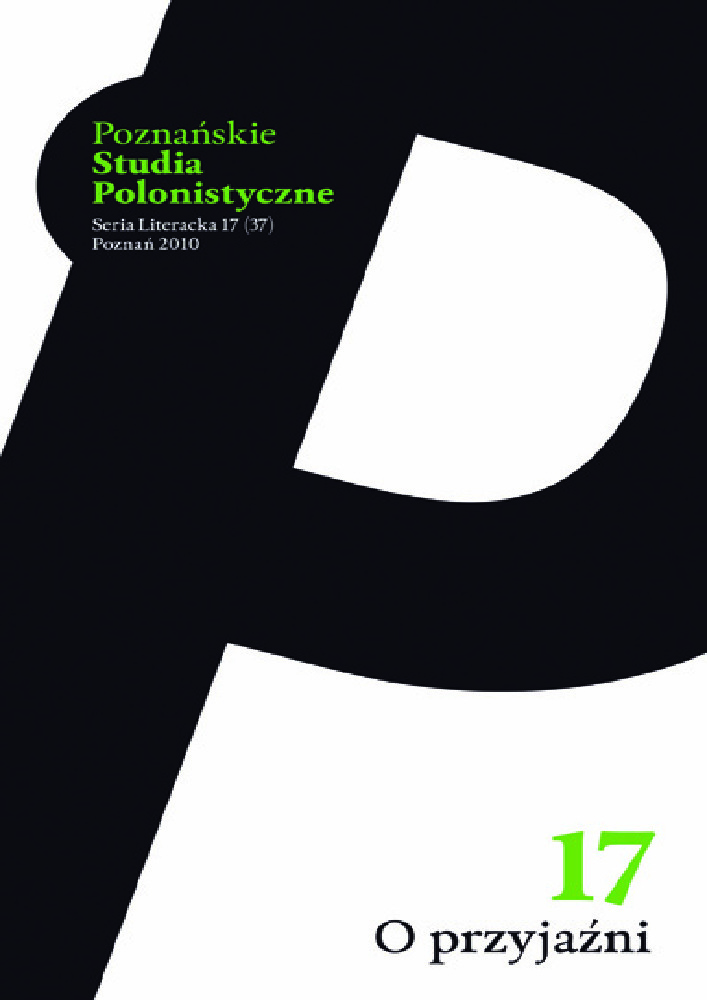Abstract
The problem of presenting the traumatic experience of deportation and detention in a concentration camp is still painfully topical, the more so that hitherto existing methods and linguistic strategies provide no useful tools for its investigation, being either frustratingly ineffective, or altogether useless. Over time, a certain regularity in handling the problem has become noticeable, i.e. a distinctive separation of the available accounts of the experience into those provided by women and those evidenced by men. The answer to the question of how to narrate has to be then preceded by an appropriate question on social, cultural and gender identity of the narrator. On the basis of the exemplary accounts by four former inmates of the concentration camp at Auschwitz-Birkenau it is possible to understand the specificity and uniqueness of feminine perception of the camp’s reality. The accounts provided by Charlotte Delbo, Liana Millu, Seweryna Szmaglewska and Krystyna Żywulska — all easily identifiable by the different adopted form of message conveyance — share the specificity of women’s subjects raised, aspects closely related to the structure of a woman and her existence in responding to extreme conditions, often omitted in accounts provided by male witnesses. Camp pregnancies, dramatic deliveries, pseudo-scientific experiments, rapes and prostitution — all these constitute additional themes related to by women, victims to the above.
References
Balansując na krawędzi słowa: specyfika kobiecych świadectw obozowych (Delbo, Millu, Szmaglewska, Żywulska)
Bukalska P., Numery w kolorze lila, „Tygodnik Powszechny” 2009, nr 14.
Camon F., Rozmowa z Primo Levim, Oświęcim 1997.
Coquio C., La tendresse d’Antigone. Charlotte Delbo, un témoignage au féminin, w: Témoigner entre histoire et mémoire. Dossier Charlotte Delbo, red. Ph. Mesnard, Paris 2009.
DeKoven Ezrahi S., Holocaust a zmieniające się granice sztuki i historii, przeł. M. Michalski, „Literatura na Świecie” 2004, nr 1–2.
Delbo Ch., Même l’humoriste n’écrit pas pour s’amuser, „Le Monde”, 23 września 1981.
Delbo Ch., Żaden z nas nie powróci, przeł. K. Malczewska-Giovanetti, Oświęcim 2002.
Holocaust w sieci dyskursów, red. A. Boroń, G. Gajewska, Gniezno 2005.
Langer L.L., Holocaust Testimonies. The Ruins of Memory, New Haven–London 1991.
Łysak T., Autobiografia (auto)biografii. „Maus” Arta Spiegelmana, w: Stosowność i forma. Millu L., Dymy Birkenau, przeł. K. i E. Kabatcowie, Oświęcim 2007.
Nikliborc A., Uwięzione w KL Auschwitz-Birkenau. Traumatyczne doświadczenia kobiet odzwierciedlone w dokumentach osobistych, Kraków 2010.
Jak opowiadać o Zagładzie?, red. M. Głowiński, K. Chmielewska, K. Makaruk, A. Molisak, Żukowski T., Kraków 2005.
Krupa B., Wspomnienia obozowe jako specyficzna odmiana pisarstwa historycznego, Kraków 2006.
Sadowska E. [wywiad udzielony z okazji 70. urodzin Szmaglewskiej], „Kierunki” 1986, nr 12.
Stosowność i forma. Jak opowiadać o Zagładzie?, red. M. Głowiński, K. Chmielewska, K. Makaruk, A. Molisak, T. Żukowski, Kraków 2005.
Szmaglewska S., Dymy nad Birkenau, Warszawa 1989.
Ubertowska A., Świadectwo — Trauma — Głos. Literackie reprezentacje Holocaustu, Kraków 2007.
Wyka K., Pogranicze powieści, Warszawa 1974.
Ziębińska-Witek A., Holocaust. Problemy przedstawiania, Lublin 2005.
Żywulska K., Przeżyłam Oświęcim, Warszawa 2006.
License
Authors
Authors of texts accepted for publication in „Poznańskie Studia Polonistyczne. Seria Literacka” are required to complete, sign and return to the editor's office the Agreement for granting a royalty-free license to works with a commitment to grant a CC sub-license.
Under the agreement, the authors of texts published in „Poznańskie Studia Polonistyczne. Seria Literacka” grant the Adam Mickiewicz University in Poznań a non-exclusive, royalty-free license and authorize the use of Attribution-NoDerivatives 4.0 International (CC BY-ND 4.0)Creative Commons sub-license.
The authors retain the right to continue the free disposal of the work.
Users
Interested Internet users are entitled to use works published in „Poznańskie Studia Polonistyczne. Seria Literacka” since 2016, for non-commercial purposes only, under the following conditions:
- attribution - obligation to provide, together with the distributed work, information about the authorship, title, source (link to the original work, DOI) and the license itself.
- no derivatives - the work must be preserved in its original form, without the author's consent it is not possible to distribute the modified work, such as translations, publications, etc.
Copyrights are reserved for all texts published before 2016.
Miscellaneous
Adam Mickiewicz University in Poznań retains the right to magazines as a whole (layout, graphic form, title, cover design, logo etc.).
